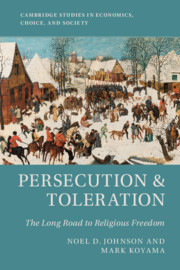Book contents
- Frontmatter
- Contents
- List of Figures
- List of Tables
- Preface
- Acknowledgments
- 1 Toleration, Persecution, and State Capacity
- I Conditional Toleration
- 2 Religion and the State in the Premodern World
- 3 Why Do States Persecute?
- 4 Jewish Communities, Conditional Toleration, and Rent-Seeking
- 5 Climatic Shocks and Persecutions
- 6 The Shock of the Black Death
- II The Origins Of Religious Freedom
- III Implications Of Greater Religious Liberty
- Bibliography
- Index
3 - Why Do States Persecute?
from I - Conditional Toleration
Published online by Cambridge University Press: 18 February 2019
- Frontmatter
- Contents
- List of Figures
- List of Tables
- Preface
- Acknowledgments
- 1 Toleration, Persecution, and State Capacity
- I Conditional Toleration
- 2 Religion and the State in the Premodern World
- 3 Why Do States Persecute?
- 4 Jewish Communities, Conditional Toleration, and Rent-Seeking
- 5 Climatic Shocks and Persecutions
- 6 The Shock of the Black Death
- II The Origins Of Religious Freedom
- III Implications Of Greater Religious Liberty
- Bibliography
- Index
Summary
Heresy, having questioned the Church and her teachings, was initially the business of the clergy and believers. It could have stayed that way. But heresy often happened to overlap with politics, whether by virtue of its internal logic or in response to initiatives made by the State itself … as Church and state were closely interlinked and each supported the other, religious protest could very easily provide a cloak for social protest: a challenge to the Church might feed on social discontent and end by undermining the fabric of the State.
Guenée (1985, 195)In early Spring 1401 at Smithfield market, on the edge of London, a crowd gathered to watch the execution of a heretic for the first time in England. At the behest of King Henry IV (r. 1399–1413), Parliament had passed De heretico comburendo – the first legislation in English history to prescribe death for heretics – and the multitude at Smithfield had assembled to see its first victim: a priest namedWilliam Sawtrey.
Sawtrey was a Lollard – the pejorative name given to followers of John Wycliff (1330–1384), a radical Oxford theologian and critic of the Church, who had translated the Bible into English. Sawtry had been caught preaching against the Roman Catholic religion and accused of rejecting its central doctrines. He denied the existence of the saints, free will, and doubted that sacraments were the blood of Christ. And, as this was the second time that he had been arrested for preaching these beliefs, he now stood condemned as a relapsed heretic.
The crowd watched as he was degraded from the priesthood and excommunicated. According to one chronicler, on being stripped of his priestly vestments, Sawtrey retorted “now your anger is spent” in the belief that this was the end of his punishment (Strohm, 1998, 43). During the fourteenth century, priests convicted of heresy in England faced merely clerical sanctions: they were degraded of the priesthood and subject to excommunication. However, De heretico comburendo prescribed a different and new sentence for relapsed heretics. Following John 15:6 which states that “If a man abide not in me, he is cast forth as a branch, and is withered; and men gather them, and cast them into the fire, and they are burned,” Sawtrey was burnt alive.
- Type
- Chapter
- Information
- Persecution and TolerationThe Long Road to Religious Freedom, pp. 52 - 72Publisher: Cambridge University PressPrint publication year: 2019



